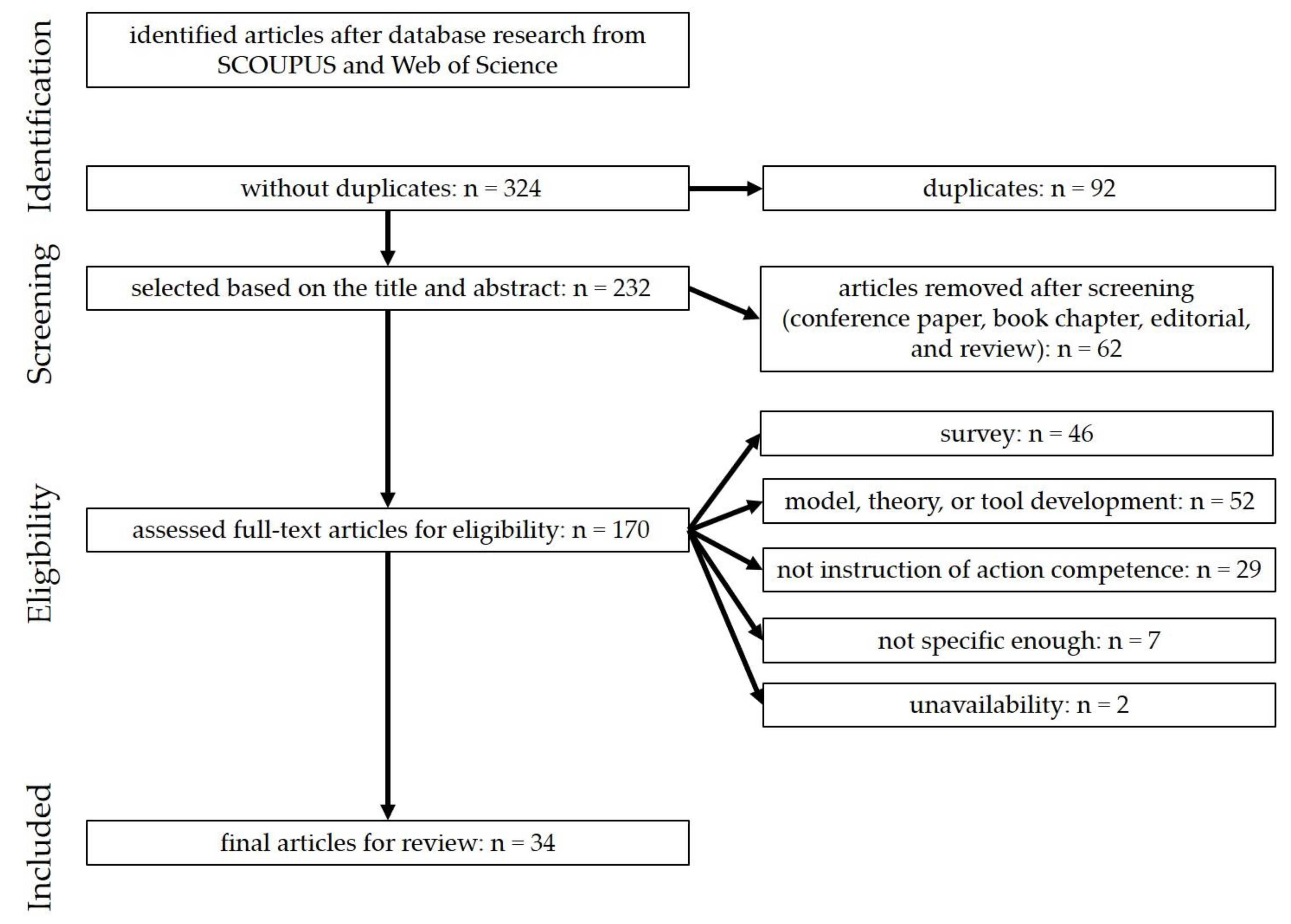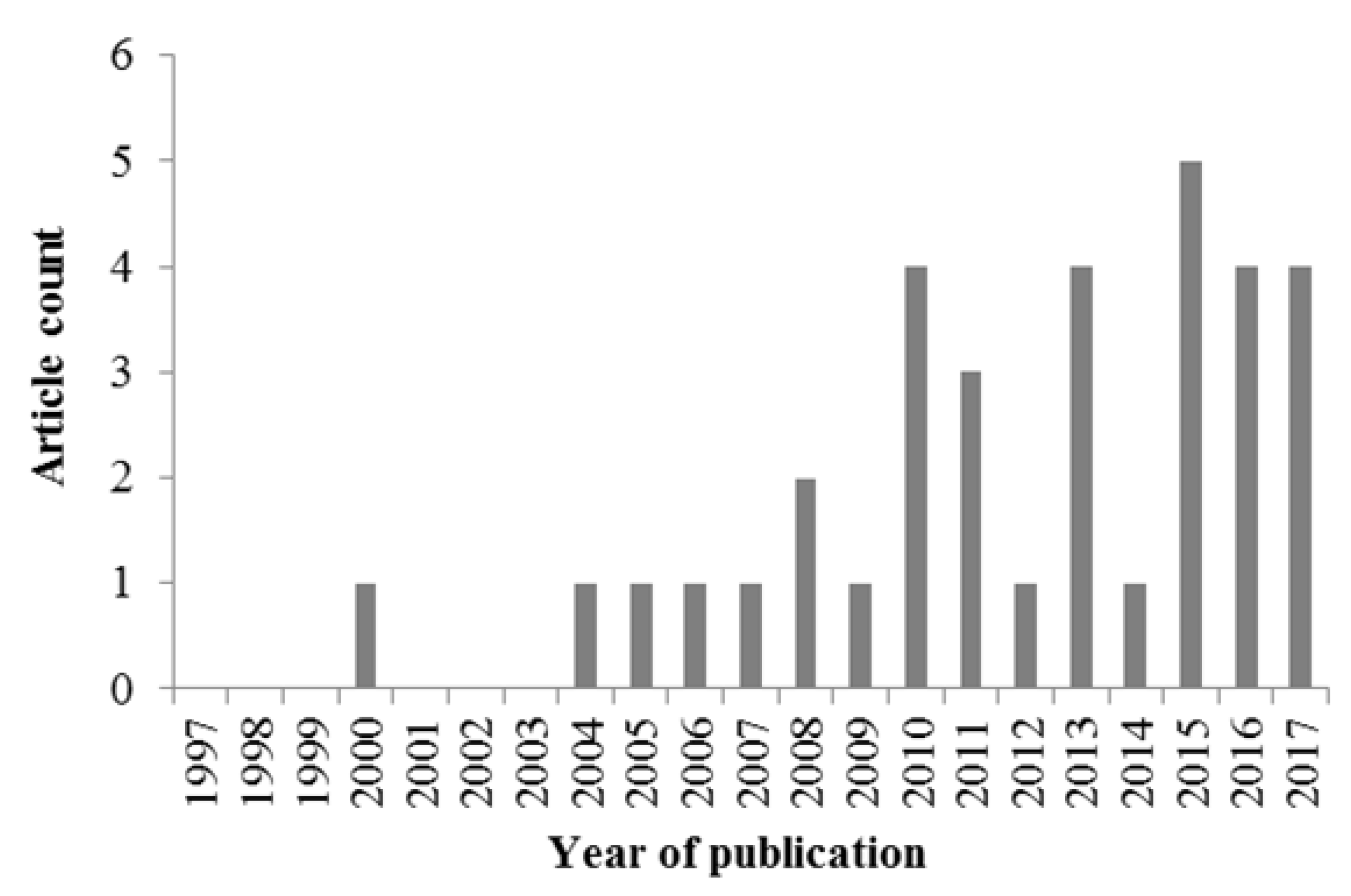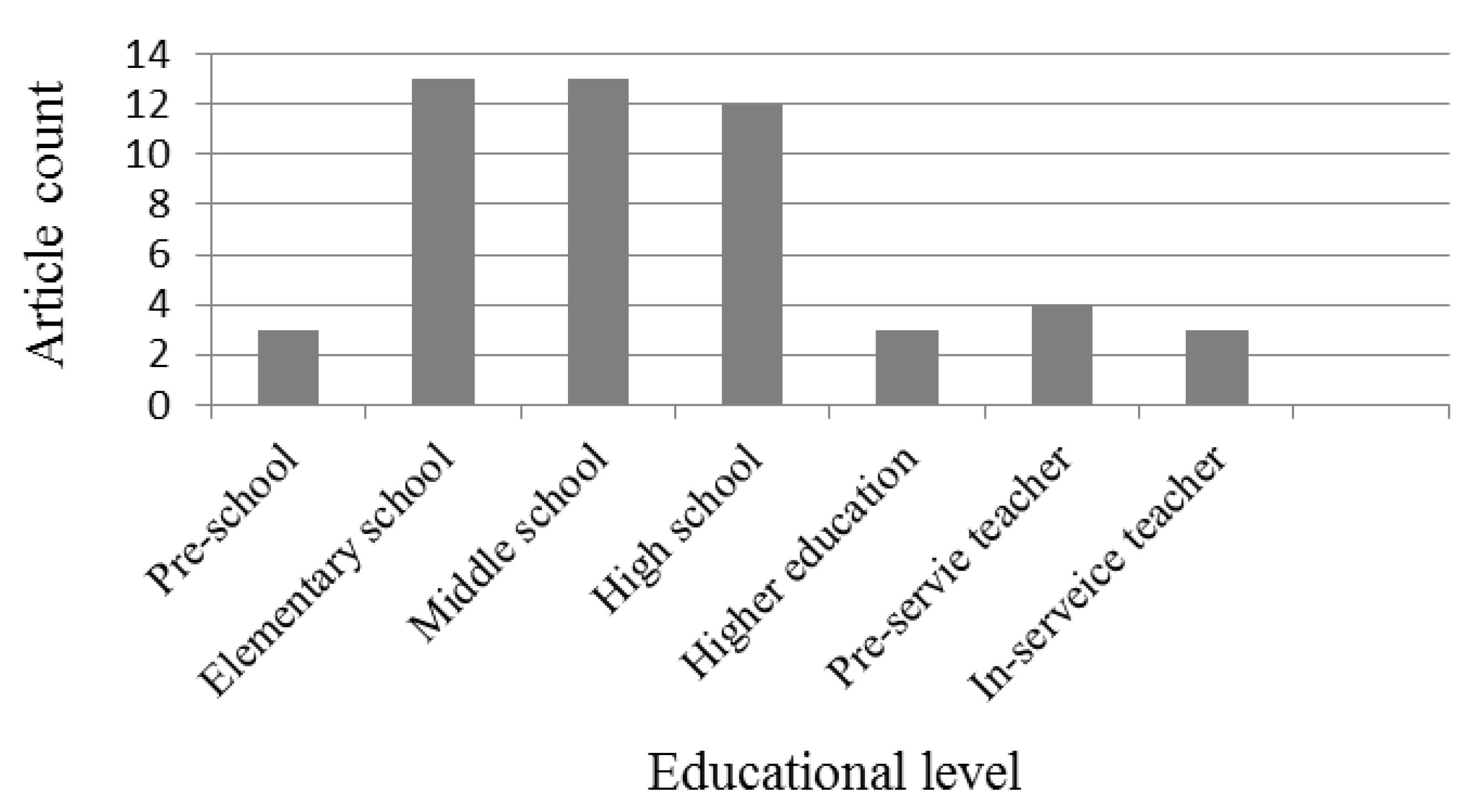Developing Students’ Action Competence for a Sustainable Future: A Review of Educational Research
Abstract
:1. Introduction
2. Methodology
2.1. Inclusion Criteria
2.2. Analysis Framework
3. Results and Discussion
3.1. Characteristics of the Studies
3.2. Research Design
3.3. Pathway of Intervention
3.3.1. Subject Matter Domain
3.3.2. Teaching Topic
3.4. Instructional setting
3.4.1. Educational Level
3.4.2. Duration of Instruction
3.4.3. Learning Context
3.5. Learning Outcome
4. Conclusions
5. Limitations
Supplementary Materials
Author Contributions
Conflicts of Interest
References
- Hungerford, H.R.; Volk, T.L. Changing learner behavior through environmental education. J. Environ. Educ. 1990, 21, 8–21. [Google Scholar] [CrossRef]
- Kollmuss, A.; Agyeman, J. Mind the Gap: Why do people act environmentally and what are the barriers to pro-environmental behavior? Environ. Educ. Res. 2002, 8, 239–260. [Google Scholar] [CrossRef] [Green Version]
- Ardoin, N.M.; Bowers, A.W.; Roth, N.W.; Holthuis, N. Environmental education and K-12 student outcomes: A review and analysis of research. J. Environ. Educ. 2018, 49, 1–17. [Google Scholar] [CrossRef]
- Stern, M.J.; Powell, R.B.; Hill, D. Environmental education program evaluation in the new millennium: What do we measure and what have we learned? Environ. Educ. Res. 2014, 20, 581–611. [Google Scholar] [CrossRef]
- Birdsall, S. Empowering students to act: Learning about, through and from the nature of action. Aust. J. Environ. Educ. 2010, 26, 65–84. [Google Scholar] [CrossRef]
- Breiting, S.; Mogensen, F. Action competence and environmental education. Camb. J. Educ. 1999, 29, 349–353. [Google Scholar] [CrossRef]
- Jensen, B.B. A case of two paradigms within health education. Health Educ. Res. 1997, 12, 419–428. [Google Scholar] [CrossRef]
- Jensen, B.B. Environmental and health education viewed from an action-oriented perspective: A case from Denmark. J. Curric. Stud. 2004, 36, 405–425. [Google Scholar] [CrossRef]
- Mogensen, F. Critical thinking: A central element in developing action competence in health and environmental education. Health Educ. Res. 1997, 12, 429–436. [Google Scholar] [CrossRef] [Green Version]
- Mogensen, F.; Schnack, K. The action competence approach and the ‘new’ discourses of education for sustainable development, competence and quality criteria. Environ. Educ. Res. 2010, 16, 59–74. [Google Scholar] [CrossRef]
- UN. Report of the United Nations Conference on the Human Environment. 1972. Available online: http://www.un-documents.net/aconf48-14r1.pdf (accessed on 3 May 2019).
- Intergovernmental Conference on Environmental Education (ICEE). The Tbilisi Declaration. 1977. Available online: https://unesdoc.unesco.org/ark:/48223/pf0000032763 (accessed on 31 January 2020).
- United Nations Educational, Scientific and Cultural Organization (UNESCO). The Belgrade Charter. 1975. Available online: http://unesdoc.unesco.org/images/0001/000177/017772eb.pdf (accessed on 5 December 2018).
- Niedermeyer, F.C. A checklist for reviewing environmental education programs. J. Environ. Educ. 1992, 23, 46–50. [Google Scholar] [CrossRef]
- Rickinson, M. Learners and learning in environmental education: A critical review of the evidence. Environ. Educ. Res. 2001, 7, 207–320. [Google Scholar] [CrossRef]
- Tilbury, D. Environmental Education for Sustainability: Defining the new focus of environmental education in the 1990s. Environ. Educ. Res. 1995, 1, 195–212. [Google Scholar] [CrossRef]
- UNESCO. Education for Sustainable Development Goals. 2017. Available online: http://unesdoc.unesco.org/images/0024/002474/247444e.pdf (accessed on 27 November 2019).
- Jónsdóttir, Á. Teaching and learning for sustainability: An Icelandic practice-based research. Int. J. Educ. Through Art 2015, 11, 391–406. [Google Scholar] [CrossRef]
- Riemer, M.; Voorhees, C.; Dittmer, L.; Alisat, S.; Alam, N.; Sayal, R.; Bidisha, S.H.; De Souza, A.; Lynes, J.; Metternich, A.; et al. The youth leading environmental change project: A mixed-method longitudinal study across six countries. Ecopsychology 2016, 8, 174–187. [Google Scholar] [CrossRef]
- Jensen, B.B.; Schnack, K. The action competence approach in environmental education. Environ. Educ. Res. 1997, 3, 163–178, reprinted in Environ. Educ. Res. 2006, 12, 471–486. [Google Scholar] [CrossRef]
- Fontes, P.J. Action competence as an integrating objective for environmental education. Can. J. Environ. Educ. 2004, 9, 148–162. [Google Scholar]
- Piasentin, F.B.; Roberts, L. What elements in a sustainability course contribute to paradigm change and action competence? A study at Lincoln University, New Zealand. Environ. Educ. Res. 2018, 24, 694–715. [Google Scholar] [CrossRef]
- Gottlieb, D.; Vigoda-Gadot, E.; Haim, A. Encouraging ecological behaviors among students by using the ecological footprint as an educational tool: A quasi-experimental design in a public high school in the city of Haifa. Environ. Educ. Res. 2013, 19, 844–863. [Google Scholar] [CrossRef]
- Uzzell, D. Education for environmental action in the community: New roles and relationships. Camb. J. Educ. 1999, 29, 397–413. [Google Scholar] [CrossRef]
- Chawla, L.; Cushing, D.F. Education for strategic environmental behavior. Environ. Educ. Res. 2007, 13, 437–452. [Google Scholar] [CrossRef] [Green Version]
- Moher, D.; Liberati, A.; Tetzlaff, J.; Altman, D.G.; The PRISMA Group. Preferred Reporting Items for Systematic Reviews and Meta-Analyses: The PRISMA Statement. PLoS Med. 2009, 6, e1000097. [Google Scholar] [CrossRef] [PubMed] [Green Version]
- Tal, T.; Abramovitch, A. Activity and action: Bridging environmental sciences and environmental education. Res. Sci. Educ. 2012, 43, 1665–1687. [Google Scholar] [CrossRef]
- Hungerford, H.R. Epilogue. J. Environ. Educ. 2010, 41, 68–69. [Google Scholar] [CrossRef]
- Varela-Losada, M.; Vega-Marcote, P.; Pérez-Rodríguez, U.; Álvarez-Lires, M. Going to action? A literature review on educational proposals in formal environmental education. Environ. Educ. Res. 2016, 22, 390–421. [Google Scholar] [CrossRef]
- Carlsson, M.; Simovska, V. Exploring learning outcomes of school-based health promotion-A multiple case study. Health Educ. Res. 2012, 27, 437–447. [Google Scholar] [CrossRef] [Green Version]
- Simovska, V. The changing meanings of participation in school-based health education and health promotion: The participants’ voices. Health Educ. Res. 2007, 22, 864–878. [Google Scholar] [CrossRef] [Green Version]
- Simovska, V.; Jensen, B.B. On-line learning environments and participatory health education: Teachers’ reflections. J. Curric. Stud. 2008, 40, 651–669. [Google Scholar] [CrossRef]
- Sayal, R.; Bidisha, S.H.; Lynes, J.; Riemer, M.; Jasani, J.; Monteiro, E.; Hey, B.; De Souza, A.; Wicks, S.; Eady, A. Fostering systems thinking for youth leading environmental change: A multinational exploration. Ecopsychology 2016, 8, 188–201. [Google Scholar] [CrossRef]
- Dittmer, L.; Mugagga, F.; Metternich, A.; Schweizer-Ries, P.; Asiimwe, G.; Riemer, M. We can keep the fire burning”: Building action competence through environmental justice education in Uganda and Germany. Local Environ. 2018, 23, 144–157. [Google Scholar] [CrossRef]
- Creswell, J.W. Research Design: Qualitative, Quantitative, and Mixed Methods Approaches; Sage Publications: Thousand Oaks, CA, USA, 2003. [Google Scholar]
- Wake, S.J.; Eames, C. Developing an “ecology of learning” within a school sustainability co-design project with children in New Zealand. Local Environ. 2013, 18, 305–322. [Google Scholar] [CrossRef] [Green Version]
- Dillon, J.; Scott, W. Perspectives on environmental education-related research in science education. Int. J. Sci. Educ. 2002, 24, 1111–1117. [Google Scholar] [CrossRef]
- UNESCO. Agenda 21. 1992. Available online: https://sustainabledevelopment.un.org/content/documents/Agenda21.pdf (accessed on 5 December 2018).
- Lynch, J.; Eilam, E.; Fluker, M.; Augar, N. Community-based environmental monitoring goes to school: Translations, detours and escapes. Environ. Educ. Res. 2017, 23, 708–721. [Google Scholar] [CrossRef] [Green Version]
- Bohnet, I.C.; Gooch, M.; Hickey, R. Young people envision the future of their local area: An explorative study from the wet tropics, Australia. Appl. Environ. Educ. Commun. 2010, 9, 185–197. [Google Scholar] [CrossRef]
- Kumler, L.M. Students of action? A comparative investigation of secondary science and social studies students’ action repertoires in a land use context. J. Environ. Educ. 2010, 42, 14–29. [Google Scholar] [CrossRef]
- Gooch, M.; Rigano, D.; Hickey, R.; Fien, J. How do primary pre-service teachers in a regional Australian university plan for teaching, learning and acting in environmentally responsible ways? Environ. Educ. Res. 2008, 14, 175–186. [Google Scholar] [CrossRef]
- Barrett, M.J.; Sutter, G.C. A youth forum on sustainability meets the human factor: Challenging cultural narratives in schools and museums. Can. J. Sci. Math. Technol. Educ. 2006, 6, 9–23. [Google Scholar] [CrossRef]
- IUCN/UNEP/WWF. World Conservation Strategy: Living Resources for Sustainable Development. 1980. Available online: https://portals.iucn.org/library/efiles/documents/wcs-004.pdf (accessed on 26 December 2018).
- UN. Our Common Future: Report of the World Commission on Environment and Development; Oxford University Press: New York, NY, USA, 1987. [Google Scholar]
- Combes, B. The United Nations decade of education for sustainable development (2005–2014): Learning to live together sustainably. Appl. Environ. Educ. Commun. 2005, 4, 215–219. [Google Scholar] [CrossRef]
- Dillon, J.; Stevenson, R.B.; Wals, A.E. Introduction to the special section Moving from citizen to civic science to address wicked conservation problems. Conserv. Biol. 2016, 30, 450–455. [Google Scholar] [CrossRef] [Green Version]
- Bascopé, M.; Perasso, P.; Reiss, K. Systematic review of education for sustainable development at an early stage: Cornerstones and pedagogical approaches for teacher professional development. Sustainability 2019, 11, 719. [Google Scholar] [CrossRef] [Green Version]
- Liarakou, G.; Kostelou, E.; Gavrilakis, C. Environmental volunteers: Factors influencing their involvement in environmental action. Environ. Educ. Res. 2011, 17, 651–673. [Google Scholar] [CrossRef]
- Norðdahl, K.; Jóhannesson, I.Á. ‘Let’s go outside’: Icelandic teachers’ views of using the outdoors. Education 2014, 44, 3–13, 391–406. [Google Scholar] [CrossRef]
- Monroe, M.C.; Ballard, H.L.; Oxarart, A.; Sturtevant, V.E.; Jakes, P.J.; Evans, E.R. Agencies, educators, communities and wildfire: Partnerships to enhance environmental education for youth. Environ. Educ. Res. 2016, 22, 1098–1114. [Google Scholar] [CrossRef]
- Aguayo, C.; Eames, C. Promoting community socio-ecological sustainability through technology: A case study from Chile. Int. Rev. Educ. 2017, 63, 871–895. [Google Scholar] [CrossRef] [Green Version]
- Simonova, P.; Cincera, J.; Kroufek, R.; Krepelkova, S.; Hadjichambis, A. Active citizens: Evaluation of a community-based education program. Sustainability 2019, 11, 663. [Google Scholar] [CrossRef] [Green Version]
- Dillon, J. On learners and learning in environmental education: Missing theories, ignored communities. Environ. Educ. Res. 2003, 9, 215–226. [Google Scholar] [CrossRef]
- Crompton, H.; Burke, D.; Gregory, K.H. The use of mobile learning in PK-12 education: A systematic review. Comput. Educ. 2017, 110, 51–63. [Google Scholar] [CrossRef]
- Williams, D.R.; Dixon, P.S. Impact of Garden-Based Learning on Academic Outcomes in Schools. Rev. Educ. Res. 2013, 83, 211–235. [Google Scholar] [CrossRef] [Green Version]
- Ernst, J.; Blood, N.; Beery, T. Environmental action and student environmental leaders: Exploring the influence of environmental attitudes, locus of control, and sense of personal responsibility. Environ. Educ. Res. 2017, 23, 149–175. [Google Scholar] [CrossRef]
- Jensen, B.B. Health knowledge and health education in the democratic health-promoting school. Health Educ. 2000, 100, 146–154. [Google Scholar] [CrossRef]
- Hodson, D. Science education as a call to action. Can. J. Sci. Math. Technol. Educ. 2010, 10, 197–206. [Google Scholar] [CrossRef] [Green Version]
- Leiserowitz, A.; Kates, R.; Parris, T. Do global attitudes and behaviors support sustainable development? Environment 2005, 47, 23–36. [Google Scholar]
- Short, P.C. Responsible environmental action: Its role and status in environmental education and environmental quality. J. Environ. Educ. 2010, 41, 7–21. [Google Scholar] [CrossRef]
- Skamp, K.; Boyes, E.; Stanisstreet, M. Beliefs and willingness to act about global warming: Where to focus science pedagogy? Sci. Educ. 2013, 97, 191–217. [Google Scholar] [CrossRef]
- Garrecht, C.; Bruckermann, T.; Harms, U. Students’ Decision-Making in Education for Sustainability-Related Extracurricular Activities—A Systematic Review of Empirical Studies. Sustainability 2018, 10, 3876. [Google Scholar] [CrossRef] [Green Version]



| Geographic Distribution | 1997–2009 | 2010–2017 |
|---|---|---|
| Number of Articles a | Number of Articles a | |
| Europe | 4 | 7 |
| America | 2 | 12 |
| Oceania | 2 | 7 |
| Africa | 1 | 1 |
| Asia | 0 | 4 |
| Research Design | No. of Articles | No. of Articles (before 2010) | No. of Articles (after 2010) |
|---|---|---|---|
| Qualitative | 19 | 7 | 12 |
| Quantitative | 8 | 0 | 8 |
| Mixed methods | 7 | 1 | 6 |
| Subject | No. of Articles | No. of Articles (before 2010) | No. of Articles (after 2010) |
|---|---|---|---|
| Inter-disciplinary project | 23 | 5 | 18 |
| Science | 8 | 2 | 6 |
| Art | 2 | 0 | 2 |
| Social study | 1 | 0 | 1 |
| Geography | 1 | 0 | 1 |
| Education | 1 | 1 | 0 |
| Topic | Number of Articles | No. of Articles (before 2010) | No. of Articles (after 2010) |
|---|---|---|---|
| Sustainability or SD | 18 | 1 | 17 |
| Environmental justice | 2 | 0 | 2 |
| Watershed management | 1 | 0 | 1 |
| Wildfire risk reduction | 1 | 0 | 1 |
| Natural resource conservation | 1 | 0 | 1 |
| Health promotion | 4 | 3 | 1 |
| Environmental health | 2 | 1 | 1 |
| Social capital in urban community | 2 | 1 | 1 |
| Environmental action | 2 | 1 | 1 |
| Global warming | 1 | 1 | 0 |
| Health and cycling | 1 | 1 | 0 |
| Garbage management | 1 | 1 | 0 |
| Duration of Instruction | Number of Articles |
|---|---|
| Less than one day | 2 |
| One day to one week | 2 |
| One week to one semester | 10 |
| One semester to one school year | 9 |
| More than one school year | 5 |
| N.A. | 6 |
© 2020 by the authors. Licensee MDPI, Basel, Switzerland. This article is an open access article distributed under the terms and conditions of the Creative Commons Attribution (CC BY) license (http://creativecommons.org/licenses/by/4.0/).
Share and Cite
Chen, S.-Y.; Liu, S.-Y. Developing Students’ Action Competence for a Sustainable Future: A Review of Educational Research. Sustainability 2020, 12, 1374. https://doi.org/10.3390/su12041374
Chen S-Y, Liu S-Y. Developing Students’ Action Competence for a Sustainable Future: A Review of Educational Research. Sustainability. 2020; 12(4):1374. https://doi.org/10.3390/su12041374
Chicago/Turabian StyleChen, Shih-Yeh, and Shiang-Yao Liu. 2020. "Developing Students’ Action Competence for a Sustainable Future: A Review of Educational Research" Sustainability 12, no. 4: 1374. https://doi.org/10.3390/su12041374
APA StyleChen, S.-Y., & Liu, S.-Y. (2020). Developing Students’ Action Competence for a Sustainable Future: A Review of Educational Research. Sustainability, 12(4), 1374. https://doi.org/10.3390/su12041374





